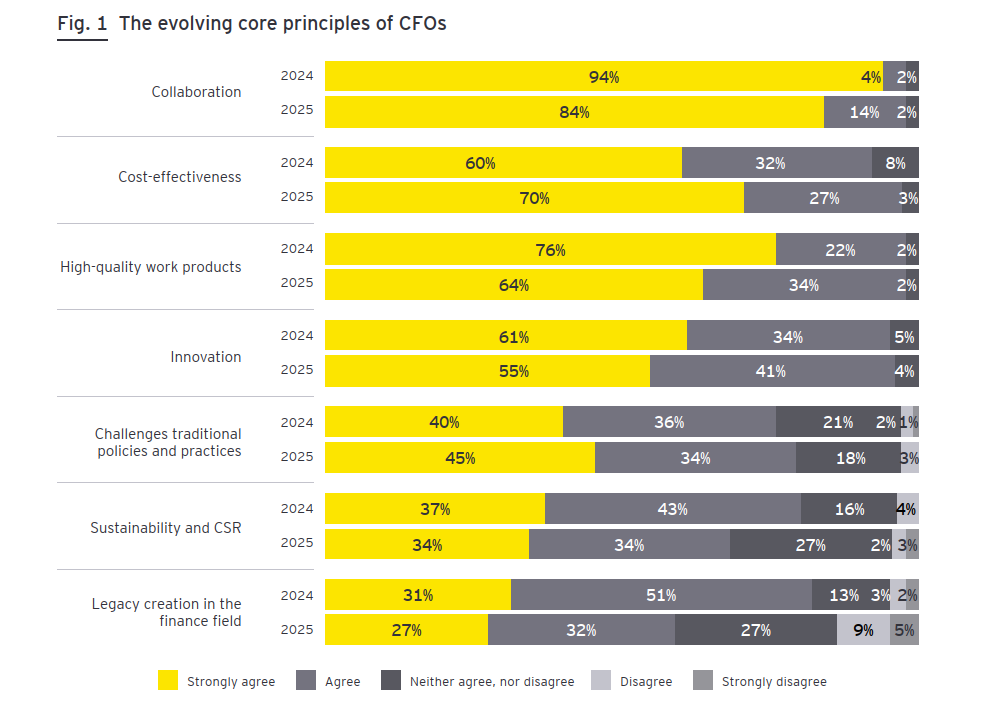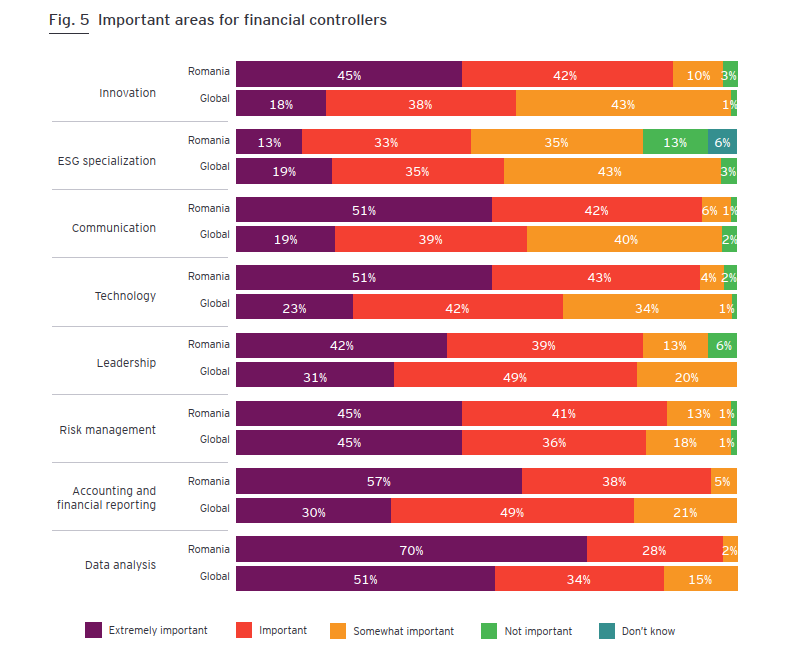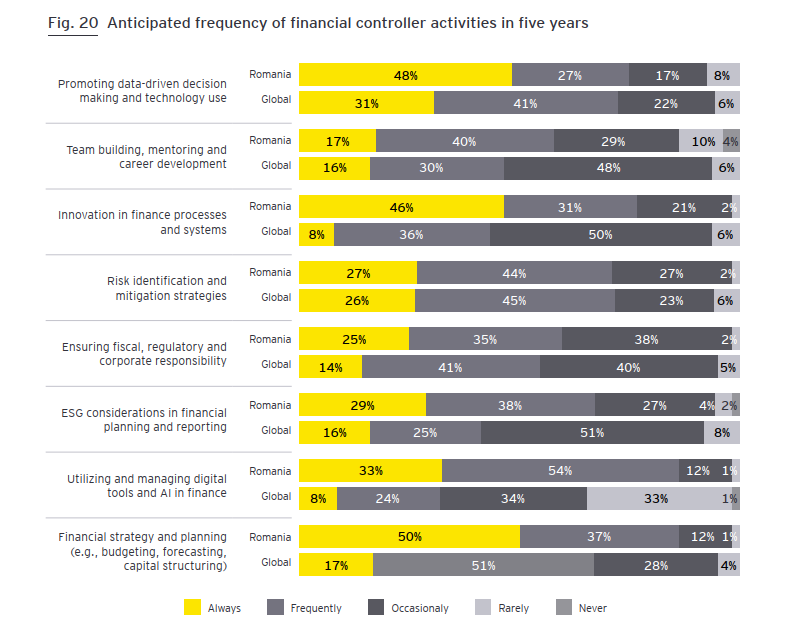EY refers to the global organization, and may refer to one or more, of the member firms of Ernst & Young Global Limited, each of which is a separate legal entity. Ernst & Young Global Limited, a UK company limited by guarantee, does not provide services to clients.

The role of financial controllers in Romania is rapidly evolving in response to economic uncertainty and digital transformation. Today’s financial leaders are expected to drive innovation, support strategic decision-making, and create long-term value. As businesses adapt to shifting conditions, financial controllers must embrace technology, data-driven insights, and cross-functional collaboration to consolidate financial strategy and operational strength. This transformation marks a new era in finance, an era defined by agility, leadership, and a proactive approach to growth.
Download CFO Imperative Series: Enabling Controllers to shape the future with confidence!

Chapter
Financial leaders 2.0
Enterprises are evolving at an unprecedented pace since the COVID-19 crisis and due to the geopolitical environment. As the world transforms, so does the role of financial leaders. Their priorities, strategies, and responsibilities constantly adapt to meet new challenges, ensuring businesses stay competitive and ready for the future.
CFOs
In the latest edition of CFO Imperative Romania, financial leaders reaffirm their commitment to collaboration, innovation, and high-quality results, all while maintaining a strong focus on cost efficiency. These priorities are still central in 2025, though there is a subtle shift toward a more measured approach. While overall agreement levels remain consistent, there has been a noticeable movement from “strongly agree” to “agree".

Financial controller
While financial controllers and CFOs share the same department, their missions differ. Traditionally, the financial controller is a senior executive responsible for overseeing an organization’s accounting, financial reporting, and cash management. Meanwhile, CFOs are usually more focused on the “big picture”. They handle financial strategy, planning, management, and the long-term financial stability and profitability of the company.
The majority of financial leaders in Romania view the performance of financial controllers positively, with 58% rating them above average. This highlights the confidence in their capabilities and contributions. However, true excellence remains rare, as only 5% believe controllers are currently operating at a “best in class” level, signaling room for further growth and development in the role.
A lack of training and skills is the main barrier keeping financial controllers in Romania from reaching “best in class” performance, according to 79% of financial leaders. This points to a significant challenge: many controllers are struggling to keep pace with growing demands due to limited opportunities for upskilling and professional development. Additionally, the demand for skilled, progressive professionals is high. More than 55% of financial leaders expressed a strong need to hire resourceful talent with an out-of-the-box mindset, reflecting the growing complexity needed in the financial controlling teams.

Chapter
Financial controller: Current role and responsibilities
The study highlights the importance of a broad skill set for financial controllers, including expertise in accounting, risk management, leadership, technology, communication, ESG, and innovation. While 70% of global respondents rate these competencies as important or extremely important, this figure rises to 85% in Romania, underscoring the country’s strong focus on developing well-rounded financial leaders to meet the profession’s evolving demands.
Survey results clearly distinguish Romania and global financial leaders in terms of their perception of key competencies.

Among respondents who rated various skills as “important” or “extremely important”, financial leaders in Romania placed significantly greater emphasis on these competencies than their global counterparts, except in the ESG domain. The most notable differences appear in communication, innovation, and technology adoption.
Technology is important for financial controllers, with 94% of respondents in Romania and 65% of financial leaders globally rating it as “Important” and "Extremely Important". Due to finance digitalization, controllers must use AI, automation, and data analytics to enhance efficiency, improve forecasting, and provide real-time insights, ensuring finance remains agile and impactful.
Financial leaders in Romania understand the importance of technology for financial controllers. However, the tech adoption across the financial controller function is low. Financial leaders in Romania realize the low adoption of new technologies as a major challenge. The most pressing areas where financial controllers in Romania require greater support and training are emerging technologies (73%), digital strategy(64%), and automation management (63%).

Chapter
Data driven finance: Embracing data and analytics
Financial controllers in Romania are more actively involved in financial strategy, planning and data analysis than their global counterparts. This heightened engagement underscores the strategic value of data analysis and reporting and highlights the growing role financial controllers play in shaping modern finance function.

Chapter
Innovation: Financial controller as a catalyst for innovation
Traditionally, financial controllers were perceived primarily as guardians of compliance, now they are emerging as key enablers of innovation. Positioned at the intersection of financial insight and business strategy, they play a vital role in helping organizations navigate digital transformation, regulatory changes, and competitive pressures. By using data, technology, and process improvements, controllers can drive efficiency, support growth, and contribute to the company’s broader strategic goals.
The survey reveals a significant contrast between financial leaders in Romania and their global counterparts when naming priorities they consider “very important” for innovation.
Among local financial leaders, collaboration with other departments to improve financial performance emerges as the top priority, with an impressive 70% rating it as crucial. Closely following, there is a strong accent on cost-saving strategies (63%), where local financial leaders place more significant importance than their global peers.
The heightened focus on cost efficiency reflects the general economic challenges, regional uncertainty, and international market instability modeling financial decisions in Romania. As a result, financial leaders in Romania are adopting a more cautious approach, prioritizing financial strength and operational efficiency in response to an unstable business landscape.
In Romania, financial leaders believe that operational efficiency improvements and leading on financial process transformation, are important for an innovative financial controller, as both hold equal importance (54%). This alignment shows that financial leaders in Romania want financial controllers to be highly focused on restructuring outdated financial operations and introducing innovative solutions to improve the business.

Chapter
The new frontier: Value creation
The role of financial controllers is evolving beyond traditional responsibilities of financial oversight. As businesses adapt to an unstable financial landscape, controllers are increasingly expected to contribute to value creation by driving growth, pointing strategic direction and nonetheless support long-term financial success.
The survey data shows that there are clear differences between global and financial leaders in Romania. Their top three priorities do not fully align, and even in areas of relative agreement, global leaders place a significantly greater focus on certain aspects.
In the case of global financial leaders (70%), directly driving company growth is the most important factor for financial controllers as value creators. In Romania, however, this is ranked second, with 18% fewer financial leaders (52%) mentioning its importance. The data shows that globally, financial controllers are much more likely to be involved in shaping financial strategies and boosting profitability. Meanwhile, financial controllers in Romania contribute to business growth but are more focused on traditional financial administration.
Globally, 50% of financial leaders report risk management as an important aspect for value creation. Through risk management, financial controllers can make sure that the business is stable, they can protect the financial health and stop potential threats that can disturb the business operations. However, in Romania, only 29% of financial leaders share this view, with a significant gap compared to their global counterparts of -21%.
Financial leaders in Romania place great trust in financial controllers, particularly in areas such as data governance and analysis. Many also recognize them as embodying important skills necessary for driving innovation. However, when it comes to value creation, the perspective shifts. In Romania, a significant proportion of respondents (19%) said that they are not very confident in the skills of financial controllers to create value. At the higher end of the confidence scale, only 44% are “mostly” and “very confident”, compared to 78% at global level.

Chapter
Financial Controller of tomorrow
In Romania, the role of financial controllers is changing as the needs of businesses, technology, and priorities continue to shift. In the years ahead, financial leaders expect controllers to take on a more active role by working more closely with CFOs and becoming more involved in daily decisions and strategies.

In Romania, financial leaders are expecting a significant prioritization in the following years for financial strategy and planning (50%) as it is perceived as the number one role local controllers will be “always” engaged in, compared to global counterparts (17%). The significant difference between local and global view is in the frequency of the engagement. While most local financial leaders see financial controllers as “always” engaged in this activity, most global leaders see it more as a frequent activity. This is the result of a potential lack of investment in solutions and skills for financial controllers that would enable them to minimize the efforts on the traditional tasks they are used to and move toward the value creation tasks.
Over the next five years, data-driven decisions and technology integration will be essential for financial controllers. These will help improve accuracy, efficiency, and strategic planning. While this focus is recognized globally, it holds even greater importance in Romania, where 48% of leaders see it as a top priority, well above the global average of 31%.
Summary
The survey data highlights that the role of financial controllers in Romania is undergoing significant transformations. Traditionally viewed as stewards of financial reporting, financial controllers must embrace expanded responsibilities by becoming strategic business partners, innovators, and important contributors to value creation.
EY is fully dedicated to supporting organizations as they redefine their financial controlling function and implement strategies to face the hardships ahead. Through collaboration, EY aims to equip financial leaders in Romania with the tools, insights, and capabilities they need to drive growth for their businesses.
Download CFO Imperative Series: Enabling Controllers to shape the future with confidence!



